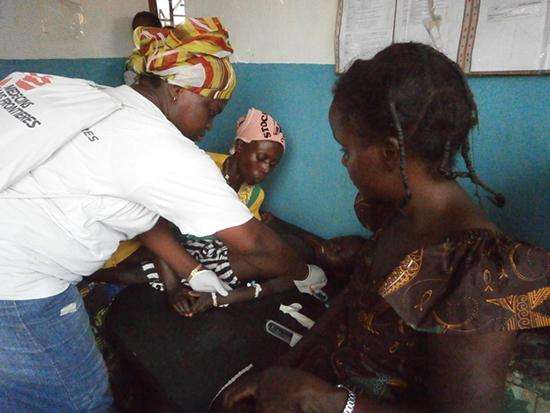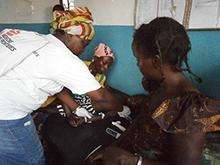MSF has launched an emergency response to combat an outbreak of malaria in South Kivu Province.
An outbreak of malaria in Lulingu, in Democratic Republic of Congo (DCR)’s South Kivu Province, is affecting large numbers of people, prompting an emergency response from Doctors Without Borders/Médecins Sans Frontières (MSF). MSF teams have already treated more than 2,500 people since the start of May.
Local authorities initially feared they were facing an outbreak of meningitis, after health facilities in the towns of Lulingu and Tchonka were flooded with patients suffering high fevers and convulsions. Most were children under the age of 15. The mortality rates at the hospital were above the threshold of 5 percent (or one in twenty patients, a figure that does not take into account those who died at home).
Once the alarm was raised, the emergency team in South Kivu immediately sent a six-member medical team to the area, using motorbikes to negotiate the trails though the forest. On arrival in the town of Lulingu, the team carried out tests and established that the patients were suffering from malaria rather than meningitis, which can have similar symptoms. Malaria is endemic in the region.
In response to the scale of the outbreak, MSF has reinforced its emergency team to include eleven Congolese staff and four international staff. They started working in Lulingu's General Reference Hospital, supporting malaria diagnosis and treatment in the pediatric and maternity wards. Later on activities were expanded to include the town of Tchonka, the second epicenter of the outbreak.
In Lulingu, the team has treated 1,526 people for malaria since May 4, using Artesunate [a drug commonly used for treating malaria] and blood transfusions when required. Malaria can cause severe anemia and patients frequently need transfusions, with blood generally provided by members of their own family. Since MSF's team started work, mortality rates among malaria patients in Lulingu have dropped from more than 5 percent to 1.29 percent.
In Tchonka, the team has carried out 1,359 consultations, with 925 cases of malaria confirmed.
The teams are also providing local communities with information about protecting themselves from malaria, and about the importance of seeking medical help as soon as symptoms appear. “Early detection is vital to shorten the time of recovery (usually one to two weeks),” says MSF’s Liliana Palacios, who is responsible for the projects in DRC. “But prevention and information (to stress the importance of a correct use of mosquito nets, for example) is also indispensable in stopping the spread of the disease.”
The teams expect their emergency malaria response to last until the end of August, given the large numbers of people continuing to arrive to Lulingu and Tchonka's health facilities with symptoms. The areas around Lulingu and Tchonka have a combined population of about 30,000.
Malaria is the cause of 40 percent of deaths among children in DRC. MSF teams in the country treated more than 434,000 people for malaria last year in its projects and emergency operations in North and South Kivu, Katanga, Ecuador, Oriental, and Maniema provinces. MSF has worked in DRC since 1981.





